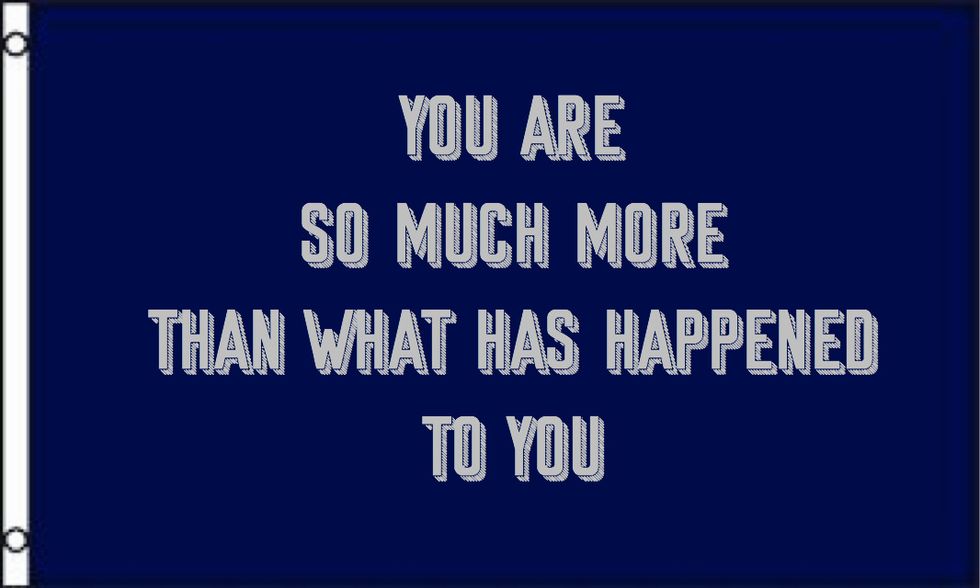Baggage: we all have it.
Whether it stem from our past, present, or self doubts about the future, being bonded to certain traumas can prevent us from moving on in life in a healthy manner.
Although this type of baggage may not be physical, the true weight of it can feel heavier than any three-piece luggage set. While "carrying" sounds similar, if not identical, to "dragging," there is actually a distinct difference. By dragging your baggage, you allow it to pin and slow you down in ways you may not realize. Even in a sense other than ourselves, dragging things rather than carrying them has always been simpler.
We are all guilty of taking the easy way out and choosing to pull our problems behind us instead of picking them up and striving to move forward. For example, by using your past emotional turmoil as an excuse to your current-day actions, you are not only hurting yourself, but those you come in contact with. Say you grew up in a situation where everyone you knew mainly used anger to express their feelings. While this may have affected how you react to strong emotions as well as changed your perception on the meaning of the phrase "'tough love," it still does not serve as an excuse to treat others around you in the same aggressive manner you once experienced. Everyone has been through instances like so, times where it may seem easier to allow that negativity to stay and accumulate rather than putting it to rest. You are entitled to take as long as needed to heal from your trauma, we all grow at different paces and no one has had the same exact experience. In the process of healing, it is important to slowly but surely work towards feeling safe within yourself again, however long that may take. Our baggage that we hold on to can be difficult to just "let go," it is easier said than done. However. carrying it little by little is still better than spending your life in a constant state of dragging and grief.
Hanging on to anger and allowing it to consume you leads to cases of anxiety, depression, and an overall idea that the world is "out to get you." While it may seem difficult, almost impossible even, to let go of the things or people that have wronged us, not doing so will cause more harm than good. Dragging your baggage gives you have the toxic backup of "Oh well the reason I'm like this is because of ________" and therefore prevents you from owning up to your mistakes.
Carrying your baggage, however, puts forth the opportunity to learn from what has held us back while giving the chance to "fix" yourself for the better. Back to the previous example, by choosing to understand that yelling and frustration is not the proper way to address one's concerns, you are able to recognize how to be a better person when it comes to having relationships with others. Carrying those issues from the past and using them as tools in lieu of simply having them there as emotional paper weights teaches you to be more compassionate and caring, as well as an overall more happier individual.
Being able to bear with those frankly useless emotions aid in helping you move past those empty feelings of shame, regret, or guilt, and replaces them with a fresh slate as you let them go to the place where they belong, in the past. Instead of saying "I can't do this because of ____," start thinking, "Because of _____, I will be able to be more aware and successful the next time."
Carrying your emotional baggage also serves in showing that you have matured as a person and do not need to play the blame game when it comes to how you conduct yourself. Being able to pick up that metaphorical three-piece luggage set in your arms and continue on with your life in a healthy manner instead of dragging it is vital. Like I mentioned before, we all have our baggage, some of it may be bigger or smaller than others but that's okay, you are not any less valid. What we all share in common is the wish to move past those pushed-down feelings of sorrow and be in a place where we feel we are in control. It may take you a week to carry your baggage, maybe a month, a year, or most of your life, there's no strict time limit on when you should be at peace with yourself. It can be difficult and maybe painful to accept what has happened to us, yet allowing yourself to be vulnerable is important on the road to acceptance.
Don't expect fast results, healing is a journey, not just a one-stop destination. Be patient and teach yourself to lift the extra emotional weight and carry the baggage rather than it leaving you with one foot in the past and one in the present.





 mr and mrs potato head
StableDiffusion
mr and mrs potato head
StableDiffusion










